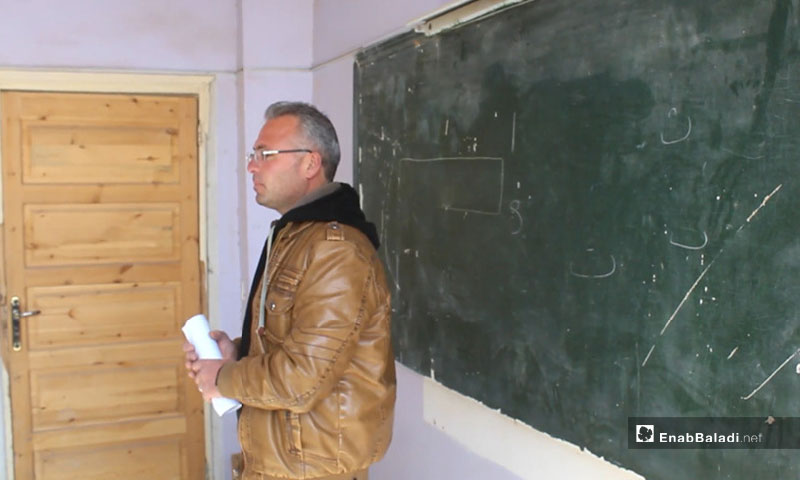Enab Baladi – Idlib | The education sector in northern Syria, especially in the city of Idlib and its countryside, is facing many challenges after the cutting of EU support and the suspension of the education grant. The most notable challenge is the difficulty of teachers’ resumption of the educational process. The salary and wage cuts have caused a financial crisis for teachers who work to secure a living.
The suspension of salaries was the reason for many to completely abandon their jobs and search for other jobs to secure their living. Abdul Wahab Makhzoum, a teacher displaced from Aleppo countryside to Khan Shaykhun, has been forced to leave the teaching profession twice, the first after he was dismissed by the regime in 2014 “for participating in the Syrian Revolution, and the second after being asked by the Free Education Directorate of the Salvation Government in Idlib to teach without a salary at the beginning of the current school year, “on the pretext that the supporting organization cannot pay the salaries of physical education teachers.”
The school administration offered Abdul Wahab and his fellow teachers to work in private classes, but they informed the Education Administration that they were not familiar with the curriculum. The Education Administration answered them that “teachers are only interested in salary and do not care if the educational process goes as it should or not,” an answer that Abdul Wahab described to Enab Baladi as “shocking”.
Abdul Wahab refused the Education Administration’s offer because he studied physical education at his will and worked for nearly ten years. He then opened a shop to sell fuel “to earn a living for him and his children,” he told Enab Baladi.
Nominal salaries and wages
Like many teachers in the city of Idlib and its countryside teacher Abdul Wahab abandoned the teaching profession after the cuts in salaries and started searching for other occupations within the limited available options to them.
Omar al-Asmar, a former teacher of English and lecturer at the Free Idlib University, opened an English language institute in Binnish after working at a school “whose teachers were not sponsored by Idlib’s Education Administration.” During their work, he and his fellow teachers received a nominal salary of $ 50 from fundraisers’ donations and traders in the area.
Speaking to Enab Baladi, Omar said that the salary he used to get was not fixed, and what led him to continue teaching without getting a salary for a whole year was the existence of the institute he opened as another source of income.
Omar noted that as a graduate of the Faculty of Arts, English Department, at the University of Aleppo, he can find another job opportunity in organizations for example, but graduates of other branches will face a difficulty in finding another job.
Volunteer students instead of graduates
Since the beginning of the revolution, the number of teachers with university degrees in Idlib and its countryside has decreased, mainly due to battles and asylum. The suspension of the EU support provided by Chemonics International, which used to cover 65 percent of teachers’ salaries, has currently become the main reason for the teachers’ decline.
Relief and other organizations have had a major role in emptying the schools of graduate teachers, because they have been announcing that they need university degree holders to work for them with high salaries, sometimes as high as US $ 1,000. This has tempted many teachers to leave their main jobs and join these organizations, according to Ibrahim Masri, a volunteer teacher who works at a school in Binnish.
Ibrahim Masri started his career in education before graduation, after the headmaster of the school where he works offered him to teach because of the lack of “graduate” teachers.
Ibrahim, a third-year student at the Faculty of Sharia and Islamic Sciences at the Free Aleppo University, accepted to teach in the same branch he is studying at the university, in an attempt to consolidate his knowledge, and “so as not to deprive students of education,” as he put it.
Hoping to receive support
In spite of all the challenges and obstacles facing teachers, some of them chose to continue teaching “because the students have no blame in all what is happening”, as such, teacher Manhal Abul Hassan, an Arabic language graduate and resident in the city of Jisr al-Shughur, described to Enab Baladi his motive to continue teaching his students without getting paid.
Manhal told Enab Baladi that he hopes to receive support from other organizations, as he continues to look for another job to help him bear the burden of the high cost of living and the increasing obstacles at all levels.











